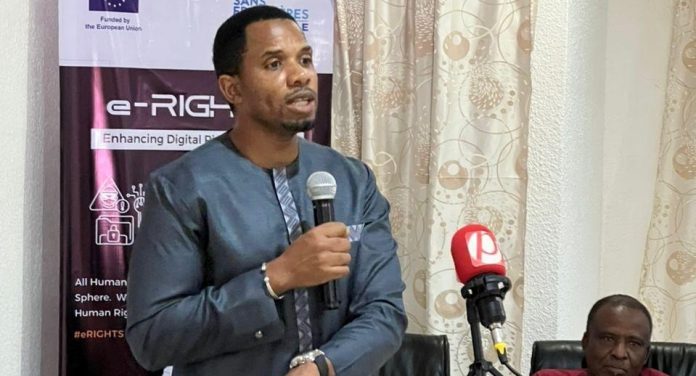Gambia’s Minister of Information, Media and Broadcasting Services, Dr. Ismaila Ceesay, has said the country’s new Personal Data Protection and Privacy Act is a cornerstone in the government’s effort to safeguard digital freedoms and citizens’ privacy amid growing concerns over surveillance in Africa.
Speaking on Monday, October 20, 2025, at a high-level side event on “Freedom of Expression and Digital Surveillance in Africa,” held at the Senegambia Beach Hotel, Dr. Ceesay said the Act demonstrates The Gambia’s commitment to building a rights-respecting digital environment. The event was organized under the Enhancing Digital Rights in Nigeria (e-RIGHTS) project, supported by the European Union, on the sidelines of the 85th Ordinary Session of the African Commission on Human and Peoples’ Rights (ACHPR).
“In today’s digital era, the right to freedom of expression cannot be fully enjoyed without strong safeguards for privacy, data protection, and protection from unlawful digital surveillance,” Dr. Ceesay said.
He explained that The Gambia’s Personal Data Protection and Privacy Act, alongside the Access to Information Act, 2021, reflects the government’s commitment to transparency, accountability, and responsible use of technology.
“Our goal is to ensure that technology becomes a tool for empowerment rather than control,” the minister stressed, adding that protecting personal data is vital to upholding public trust in governance and strengthening democracy in the digital age.
Dr. Ceesay warned that while digital technologies have revolutionized communication and citizen engagement, they have also introduced serious risks such as mass surveillance, data misuse, misinformation, and online harassment. He urged African governments to strike a balance between national security and citizens’ rights, ensuring that state surveillance is conducted lawfully and ethically.
The minister emphasized the importance of regional cooperation in addressing cross-border data and digital security challenges, noting that partnerships between governments, civil society, academia, and the private sector are essential to protecting citizens online.
“The digital future of Africa depends on our collective resolve to defend the dignity, privacy, and freedoms of our people,” he said. “The Gambia stands ready to work with partners across the continent to advance a secure, open, and rights-respecting digital environment.”
He also called for greater attention to online safety, particularly for women, youth, and vulnerable groups who face increasing risks of cyberbullying, harassment, and data exploitation.
The side event brought together representatives from the African Commission, the Avoca San Frontier delegations, civil society organizations, and the media to discuss how African states can strengthen human rights protections amid the expanding use of surveillance and digital technologies.





















